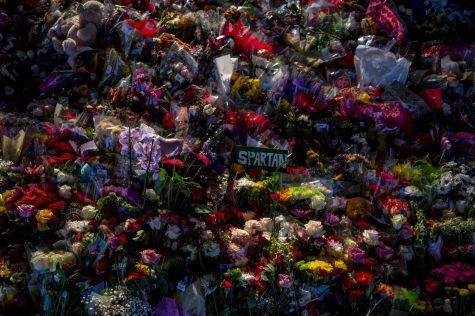MSU mass shooting stirs safety reflection on campus
February 20, 2023

As students at Michigan State University returned to classes today following a deadly mass shooting a week ago, Dave Palazzolo, a first-year film major, said he is not sure he feels any safer at Columbia, even though the college’s campus is generally not open to the public.
At Michigan State, Anthony McRae, a 43-year-old with a previous gun violation, was able to walk into an academic building and student union on Feb. 13 without any apparent connection to the campus of 50,000 students. He shot into a classroom, killing two students. A third student died when he opened fire at the Student Union. Five more students were wounded. McRae was later found dead from an apparent self-inflicted gunshot wound.
“I wanna say yes,” Palazzolo said about feeling safe at Columbia, noting the campus’ ID scanning requirements. But he was worried that it was not foolproof. “If a person were to try to sneak into the building or something, I don’t doubt that they may have some pretty good ability to do that, and that’s a scary thought to have.”
At the entrance to each campus building, Columbia has security desks with guards monitoring student and employee entry, where it is required to scan appropriate identification. Visitors cannot enter without prior approval.
Security company Allied Universal works with Columbia to staff security positions. “Allied Universal has an extensive training program,” said Operations Manager James Belin, who manages all security staff on campus. Guards take an 11-hour course.
Belin said staff also meet daily on Zoom to keep trainings fresh.
“Especially in light of that fact that this is more and more of an occurrence. Every time you turn on the news, it’s gun violence,” Belin said. “So we keep it fresh in [the security staff’s] minds that this is [their] responsibility in an emergency situation.”
Columbia’s Office of Campus Safety and Security also holds optional monthly presentations for faculty and staff on how to deal with active shooters. The training includes defensive skill lessons from Mark Brticevich, coordinator of Wellness, Athletics and Recreation at Columbia and an adjunct professor in the Science and Math Department.
“Ultimately [faculty] are going to be looked toward as the leaders, so it is important they understand and give instruction on what to do in active shooter incidents,” Belin said.
The next session is planned for Feb. 27 in the 623 S. Wabash building. Faculty and staff must register to attend.
Columbia’s campus follows the “Run, Hide, Fight” protocol recommended by the Department of Homeland Security. It was originally introduced in 2008 and used across the nation, including at MSU.
The active-shooter response includes taking these safety measures:
- Evacuate the premises if there is an accessible, safe path.
- If evacuation is not possible, find a room where you can lock a door, hide and call 911.
- As a last resort, attempt to incapacitate or disrupt the active shooter by throwing objects or otherwise getting physically aggressive.
Rose Casolari, a senior television writing and business major, has many peers who went through the Oxford High School mass shooting, including people she now knows at MSU.
In November 2021, four students were killed in a shooting at Oxford High School in a town 40 miles north of Detroit. East Lansing, where MSU is located, is 90 miles west. Some graduates from Oxford enrolled at MSU and have now experienced their second mass shooting in two years.
In an email to the Chronicle, Casolari, originally from Michigan, said both of these shootings spurred conversation in her family.
“We as a country have started to become numb to these shootings,” Casolari said. “How did we get so desensitized to death and violence?”
Last week, Michigan Senate Democrats introduced 11 basic gun safety bills to implement universal background checks, safe storage requirements and “red flag” laws.
Casolari said she has been waiting a long time for this moment, as she and a survivors’ group called “No Future Without Today” were advocating for this over the summer with Michigan Attorney General Dana Nessel.
“My hope is that if this bill can pass in a politically mixed state like Michigan, stronger bills will also have a chance,” Casalori said.
Prompted by the MSU shooting, Maxwell Mootz, a senior film major, made a post to the Engage application imploring students to write letters to President Joe Biden and other government representatives.
“If we are just solely allowing the higher-ups to make our decisions for us, you know many of the higher-ups have not experienced the grief or personal complications that victims of these families have,” Mootz said.
In his own letter to Biden, Mootz said he wrote about the need for gun control and media coverage reformation.
More information on campus protocols and upcoming presentations at Columbia College can be viewed here.







